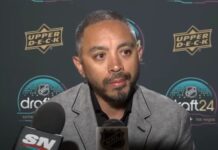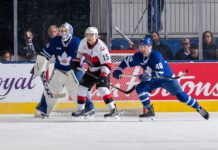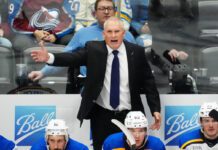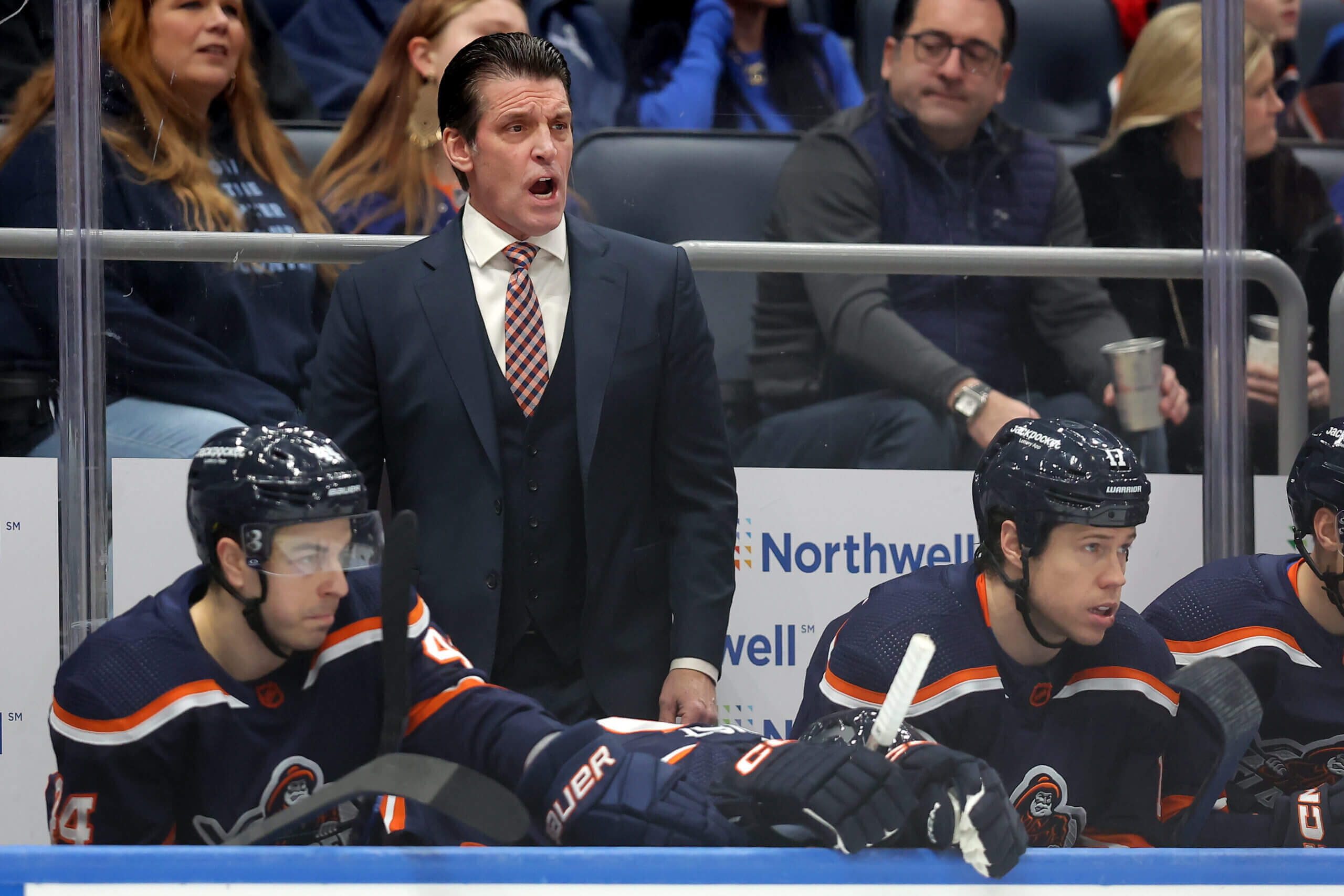We have the first official addition to Craig Berube’s coaching staff.
Elliotte Friedman and Darren Dreger each reported that Lane Lambert has been all but hired at this point. In Friedman’s exact words, “With (Lane) Lambert, it’s just a matter of (the Leafs) making an announcement.”
Lambert, who will turn 60 in November, has been coaching since his professional hockey career ended. He started as an assistant coach with the Moose Jaw Warriors for the 2002-03 season. In his third season with Moose Jaw, the Prince George Cougars got off to a slow start, and Lambert made a rare in-season move, jumping from an assistant with Moose Jaw to head coach of Prince George.
Lambert’s Prince George teams weren’t particularly strong or successful in his two years there (fun fact: Justin Pogge was their goalie, and their most notable NHLer in that time was Dustin Byfuglien). In his one full season, the team went 26-41-3-2 but had every intention of bringing Lambert back the following season. Lambert, however, wanted a coaching job in the USA and moved to the AHL to serve as an assistant with the Bridgeport Tigers.
Following a year with the Tigers, Lambert moved to the Nashville Predators organization as an assistant with their farm team in Milwaukee. This is where his career really started to take off.
After a season as an assistant, the Saskatchewan native was promoted to head coach. Lambert’s Milwaukee Admirals teams were always successful, averaging 44.5 wins over the four seasons and finishing in the top 10 in goals against in all four years, although they never advanced beyond the second round. Particularly impressive is the list of players who played full seasons under Lambert with Milwaukee and graduated to NHL careers: Roman Josi, Pekka Rinne, Cody Franson, Patric Hornqvist, Rich Peverley, Mike Santorelli, and Nick Spaling are the most notable players in that group.
After four years with the Admirals, Lambert was promoted to the NHL, becoming an assistant coach under Barry Trotz with the Predators (another fun fact: Peter Horachek was the associate coach of the Preds at the time). They made the playoffs and lost in the second round that year, but Nashville missed the playoffs in the following two seasons.
In Nashville, Lambert was originally hired to oversee special teams, and his first season was a resounding success in this regard as the Predators boasted the top-ranked power play in the league and 10th-best penalty kill. The second year, though, was a different story. The power play finished 17th and the penalty kill 29th, eventually leading to a demotion of Lambert’s responsibilities as Trotz announced mid-season that he would take over the management of Nashville’s special teams.
Trotz, however, not only retained Lambert for what turned out to be his final season in Nashville but brought him to Washington to coach alongside him again. In Washington, Lambert primarily managed the forwards and was largely successful in the role. The Capitals were seventh, second, third, and ninth in goals per game in his four seasons, and they won the Cup in his final season with a team that averaged 3.58 goals per game in the playoffs – the highest mark in the league at the time.
The penalty kill ranked 14th, second, seventh, and 15th in his four seasons with the Capitals – it was good to very good every year – which, even on the low end, would be a welcome ranking for a Leafs team that finished 23rd in 2023-24.
Lambert’s approach to the penalty kill
While researching his past teams’ penalty kills, Lambert’s aggressive philosophy really stood out.
Jay Beagle spoke about Lambert’s approach to the Capitals penalty kill:
“In the past with different coaches, when one guy’s pushing or pressing hard, not everyone goes, so they can relieve that pressure. With him, he likes us when one guy’s going and you feel that pressure moment — everyone goes, and it’s a four-man unit. With him, it’s cool because it’s a unity thing where everyone’s on the same page and we all go at the same time.”
Beagle spoke about “trigger moments” when the puck is available – the times when the PKers should pursue it aggressively – and how Lambert encourages not just an initial attacker but overloading the puck to win the battle and get it out. The Leafs battled issues with trigger moments all season, often looking uncoordinated in their puck pressures. This power-play goal by the Bruins in the playoffs really stood out as two penalty killers watched the battle from a stick length away instead of actively engaging to try to win the puck. When the Leafs lost the battle, it led to an easy Bruins goal.
After winning the Cup in Washington, Trotz and Lambert went to Long Island and enjoyed instant success, going to back-to-back Eastern Conference Finals. Lambert filled the same role – forwards and penalty kill – and the penalty kill ranked 17th, 15th, and sixth.
Casey Cizikas spoke about Lambert’s strategy:
“(Lane Lambert) has preached to us, when we see an opportunity, to go. He’s given us a bit of a longer leash when it comes to that. It’s all about reading where their guys are. Even if we stop the play down in their end, it’s five seconds they have to regroup. It’s something we’ve worked on and something we’re getting better at.”
Lambert’s penalty kills have two clear themes: aggression and deploying talented players on the PK. In Washington, he used shorthanded players who weren’t really thought of as penalty killers at the time, including Tom Wilson, TJ Oshie, Nik Backstrom, and even Justin Williams at times. In New York, Brock Nelson, Josh Bailey, and Anthony Beauvillier played expanded PK roles.
In reviewing his Capitals and Islanders penalty-killing groups, it’s notable that Lambert always had a right-handed defenseman on the top penalty-killing unit. Conor Timmins is currently the Leafs’ only right-handed defenseman under contract. We’ll keep repeating this until it eventually happens, but the Leafs need to make their mark in the right-handed defenseman market this summer. They simply can’t come up empty.
Lambert’s forward deployment & fit as an AC
As mentioned, Lambert also oversaw his teams’ forward groups, and as a disciple of Trotz, it’s no surprise that he generally tried to build depth and four contributing lines. Most famously, fans will likely remember “the identity” line the Islanders deploy with Matt Martin, Casey Cizikas, and Cal Clutterbuck, who get pucks in deep and set the tone or change the momentum.
Alex Ovechkin’s lowest time on ice over a full season also came under Trotz/Lambert (although he averaged over 20 minutes in his three other seasons with them). Trotz has always been a team-first coach, and the following quote stood out when Trotz took over in Washington. Note that Lambert was Trotz’s right-hand man, and now he will likely be tasked with the same under Berube in Toronto.
It’s the culture. I just think a little bit of the inmates were running the asylum. That’s number 1. I think there’s good talent, and I felt it needed some order.
However, Washington, particularly when they won the Cup, rode their stars hard to success. They are one of the only teams in the past 15 years to win the Cup with four forwards averaging over 20 minutes per game (Backstrom, Ovechkin, Kuznetsov, and Oshie). Tom Wilson emerged under Trotz and Lambert. Kuznetsov produced his best season ever under them. They squeezed out contributions from players like Brett Connolly and Devante Smith-Pelly. Lars Eller enjoyed a career-high year under the pair. On Long Island, Brock Nelson put together one of his most productive seasons under Lambert.
I wouldn’t identify a hard and fast rule either way regarding Lambert and ice time. In one Conference Finals appearance, the Islanders didn’t have a single forward average more than 18 minutes per game. The year before, they went to the conference finals with six forwards above the mark. He’ll roll them or load it up depending on the personnel and performance. That could be quite different for a Leafs team that seemed to have ice time allotted to certain players, come hell or high water.
Lambert was most recently the head coach of the Islanders, who made the playoffs in his only full season coaching the team before he was fired in January of his second season after a four-game losing streak that dropped their record to 19-15-0-11 at the time. Replacing Barry Trotz was always going to be tough, especially as the Islanders’ top players aged out, and it showed. The Isles were fifth in goals against his one full season and owned the ninth-ranked power play, but their power play was 30th, and they simply couldn’t score.
Frankly, the Isles didn’t have the talent to score, and they still don’t at the time of writing. Many observers will look at his 1.5 years with the Isles and draw conclusions rather than his 11 years spent as an assistant, which is the job he will do in Toronto. By and large, Lambert has been effective in the AC role. He has strong team success in the role on his resume, culminating in a Cup, and his penalty kills have generally been good to great.
On the rest of Craig Berube’s staff, and the value of experience
While no decisions have been announced on any of the Leafs’ remaining assistant coaches – Mike Van Ryn, Dean Chynoweth, and Guy Boucher – it wouldn’t make much sense on paper to hire Lambert, who has traditionally coached the penalty as an assistant coach, and retain Chynoweth, who has overseen the penalty kill since he was hired. Under Chynoweth’s watch, the penalty was strong in his first year, finishing eighth. The following season was still solid at 12th. But this year, the bottom fell out on the PK; it finished 23rd in the regular season before it was a major liability in the playoffs.
Chynoweth also started his tenure in Toronto by overseeing not just the penalty kill but also the defense. However, when Brad Treliving was hired, Mike Van Ryn was brought in to coach the defense, so Chynoweth lost that responsibility and was solely focusing on the penalty kill, which fell apart. Knowing those facts, it’s no surprise Chynoweth will not remain part of the staff.
I still think Marc Savard would make a ton of sense as the power play/offensive coach if the Leafs can swing it. Savard would oversee the PP unit while Lambert runs the penalty kill and potentially the forwards. They are likely to retain Mike Van Ryn, as Friedman noted, considering Berube is already familiar with him, and he did some reasonably encouraging things with a limited defense group in 2023-24 (Simon Benoit emerged, Jake McCabe produced a career year, and the defense was solid in the playoffs relative to the personnel).
It also appears the Leafs are placing more emphasis on hiring coaches with experience than in the past. Manny Malhotra and Paul MacFarland came to Toronto after brief three- and two-year stints with Vancouver and Florida teams that didn’t win anything. Dave Hakstol came in with four years of experience in the league, although admittedly, they were all spent in a head coaching role. Spencer Carbery’s first NHL job was with the Leafs. The same goes for Sheldon Keefe.
Citing a coach’s experience among the coaching retread market can sometimes lead to eye-roll reactions, but generally speaking, I prefer the experience. Coaches have player networks just like any other profession (for example, Lambert not only won a Cup with Chandler Stephenson in Washington, but they were actually neighbours at one point). The more a coach has seen, the more players they know and the more intel they can share with the organization. Lambert has been in the league for 13 years already, which comes with a lot of built-in networks and knowledge of the league compared to younger assistants who are learning on the job (or coaches who leave and talk about coaching in the “real NHL”). Berube, by extension, has been in the NHL for 17 years. The Maple Leafs, by and large, shouldn’t be an entry-level position for coaches. There is too much scrutiny and attention. Experience is an asset to lean on, and a conviction of belief comes from having already built a foundation elsewhere.
Now, we will see if Lambert can bring his experience to Toronto and help straighten out a penalty kill that caused the team all sorts of problems last season.






























![New Leaf Anthony Stolarz on the opportunity in Toronto: “In Florida, I knew my role as a backup… Now, [Joseph Woll] and I are competing for starts… As a goalie, that’s all you can ask for” Anthony Stolarz, Stanley Cup win, now Maple Leaf](https://mapleleafshotstove.com/wp-content/uploads/2024/07/anthony-stolarz-sc-100x70.jpg)
